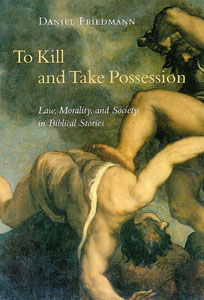Shaking the Foundations

When we think of the Law of the Bible, we think of Moses, the lawgiver, coming down from Mt. Sinai with the Ten Commandments carved on stone tablets. The symbolism of God’s Law being “set in stone” is not lost on us. Of course, Moses finds the people worshiping the golden calf, smashes the tablets and has to climb back up the mountain to get a second copy. Nevertheless, we see Moses’ initial descent from Sinai as the very moment when God decreed, once and for always, the basic, unchanging foundation of God’s Law for God’s People. Moses completed the process of proclaiming God’s Law during the Exodus. And, tradition has it, the Law of Moses remained in force long after Israel reached the Promised Land.
We get a very different picture, however, when we read Daniel Friedmann’s recent book, which was a bestseller in Israel: To Kill and Take Possession: Law, Morality, and Society in Biblical Stories. From our initial encounter with Friedmann’s rather off-putting title (it refers to a practice that the Bible condemns, that of killing someone in order to be able to seize control of the person’s property), To Kill and Take Possession prompts a thorough reconsideration of the traditional understanding of God’s laws as “eternal and valid forever.”
Already a library member? Log in here.
Institution user? Log in with your IP address.

